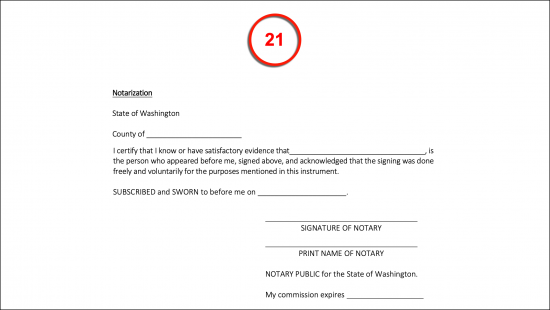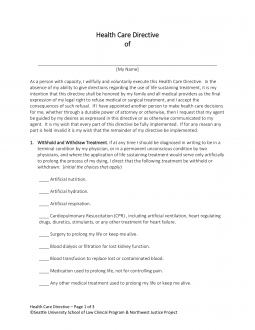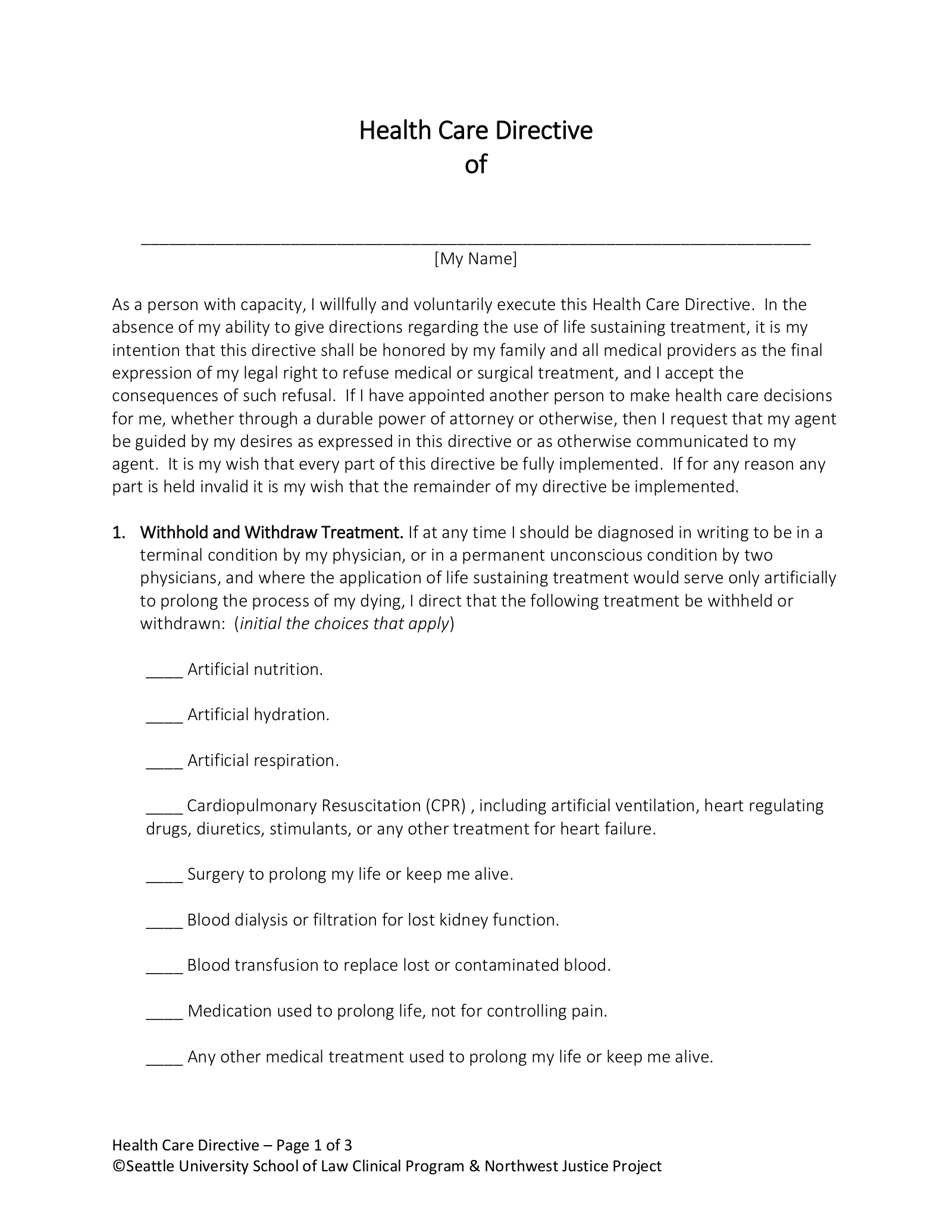Updated August 03, 2023
A Washington living will is a directive that lets a person select their end-of-life treatment preferences to medical staff. The living will is eligible for use if the patient is incapacitated and cannot make decisions for themselves. The most common use is to instruct whether the patient would like to receive life-sustaining treatment if their condition is terminal.
Laws
- Signing Requirements – Two (2) witnesses or a notary public (RCW 70.122.030(1)).
- Statutes – Chapter 70.122 RCW (Natural Death Act)
How to Write
Download: PDF
Washington Declarant
(1) Name. The State of Washington allows Patients a certain amount of power when facing a diagnosis of being permanently unconscious or when an end-of-life event is unavoidable because no treatment exists. Record your name to complete this directive’s title so that you may document what your medical preferences are when in either or both of these medical conditions. This document will enable Washington Physicians to have a better understanding of your treatment choices even while you are incapacitated beyond communication.

Refusing Treatment In Washington
(2) Artificial Nutrition. While the declaration made at the opening of this directive will make a blanket statement, several treatments or procedures must be considered then approved or denied. For instance, if a Washington Patient is unable to eat, he or she will likely be susceptible to the effects of severe malnutrition. To offset this scenario, attending Washington Doctors will wish to deliver the nourishment needed to live using medical technology (machines). To inform Washington Doctors that you would find being provided with nutrition artificially to be intolerable and will not approve of it being administered, supply your initials to the first item in Article 1.
(3) Artificial Hydration. A similar decision must be made regarding the delivery of water and other liquids directly to your system using a machine. If you do not wish to be hydrated artificially, produce your initials for the second item.
(4) Artificial Respiration. If you are diagnosed with a terminal condition in the State of Washington or rendered permanently unconscious, then, depending on the nature of your medical condition or injury, you may lose the ability to breathe. For instance, your airway may be inflamed or blocked. Washington Physicians can be told that you do not wish a machine used to aid your breathing if this treatment will only prolong life and not cure your terminal condition or revive you from a permanent coma if your initials are delivered to the third list item.
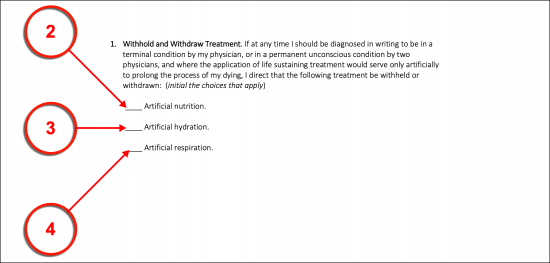
(5) Cardiopulmonary Resuscitation (CPR). An important scenario to consider is one where your heart and/or lungs stop or can no longer function well enough to maintain a steady flow of oxygenated blood to your brain. Death is close when such a medical condition strikes. If the fourth list item is not initialed then Washington Doctors will proceed to prolong your life after cardiopulmonary failure while you are permanently unconscious or terminal using CPR. If you do initial the fourth item, then Washington Doctors will be informed that you do not approve of cardiopulmonary resuscitation.
(6) Surgery. Some long-term conditions such as a permanent coma or a terminal condition can render you unable to communicate to inform Physicians whether you would approve of surgery. If you intend to deny any surgery that does not directly effect a cure or recovery and that will only extend your life then you must produce your initials to the fifth statement to state this denial to future Washington Medical Personnel.

(7) Blood Dialysis. You can approve of blood dialysis administered to aid your kidneys (when needed) by leaving the sixth statement unmarked. If, however, you will not consent to the administration of blood dialysis given only to prolong your life after you have been incapacitated by an incurable life-threatening medical condition or coma then, initial the “Blood Dialysis” statement.
(8) Blood Transfusion. If you are in a permanent condition of unconsciousness and/or have a medical condition for which recovery is deemed highly improbable to impossible and your blood becomes contaminated (I.e. a poison, an allergic reaction, a disease) or your body is unable to produce blood then Washington Physicians will seek to replace the contaminated blood with viable plasma or blood. If this will not promote or directly cause your recovery then you have the option of consenting or denying it. To deny this treatment, initial the seventh statement.

(9) Medication. In most cases, when you are struck down with a life-ending medical condition or a permanent coma, you will need certain medications administered to maintain vital functions. This is can be especially true for those with pre-existing (separate) conditions. If you do not wish Washington Physicians to prolong your life with medication when you are terminally ill or in a lifelong coma then initial the eighth statement. Notice this will not apply to pain medication. You may address the topic of pain medication later in this document.
(10) Any Other Medical Treatment. There may be undiscussed medical procedures, treatments, and/or medications needed to keep you alive without curing your condition that has not been discussed in the list above (i.e. radiation therapy). If there are medical treatments that you do not consent to receive when all they will do is prolong your life, then initial the final statement.

Pain Management Directive
(11) Comfort Treatment. There may be times when a Washington Patient who is suffering from an incurable medical condition will be in a significant amount of pain. Article 5 of this declaration shall instruct Washington Physicians that the relief of pain should be the focus of treatment when you are terminally ill, near an end-of-life event, or have an incurable medical condition. This means that pain management treatments and medications will be administered even if they may shorten your expected lifespan. This article may be crossed out or removed if you do not wish to issue this instruction however, it is strongly recommended that a Washington Physician is consulted regarding potential medical conditions and their treatment before doing so (or signing this paperwork).

Pregnancy Directive
(12) Declaration Effect. Many would consider it wise to handle the topic of pregnancy in this directive. If you wish this directive to be effective after you have been declared as having an incurable medical condition and/or in a permanent vegetative state even while pregnant, then you must initial the first statement made in the fifth article.
(13) Disavowing Declaration For Pregnancy. If you wish to make this document void for the duration of your pregnancy then, initial the second statement presented. This will mean that the declarations made here will be suspended the moment it becomes known that you are pregnant regardless of your medical condition or expected lifespan.

Additional Directions
(14) Direct Health Care Instructions. Any part of the above directive can be removed or edited at your will. If you would like to deliver additional medical directions or preferences to Washington Medical Professionals reviewing this document then use the available space in Article 6 to present your medical decisions. If desired, you may attach a document with such information that is titled (i.e. Attachment A) then named in this section. It is suggested that such changes (removals or additions) be made after completing a consultation with a Washington Medical Professional who is aware of your current health status.

Washington Declarant Signature
(15) Your Signature And Signature Date. You must sign and date this document to issue it as an official declaration of your medical decision in the State of Washington. This act will need to be authenticated in this state by either two Witnesses or a Notary Public therefore, make sure the relevant observing Party is present when you sign your name and enter the current calendar date

Statement Of Witnesses
(16) Statement Preparation. The “Statement Of Witnesses” must be supplemented with the Washington Declarant’s name (You).
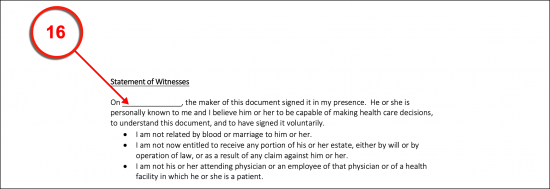
Witness 1 Signature
(17) Signature Requirements For Witness 1. The first Witness, who is an adult and impartial to your directives, must review the statement made after he or she has watched you sign your name. This Witness will then sign his or her name and report the current date. Note that all signature dates will be the same.
(18) Contact Information Of Witness 1. In order to claim to be able to verify your signature, Witness 1 must be reachable in the future. To this end, Witness 1 must submit the address and telephone number where he or she can be found.
(19) Signature Requirements For Witness 2. The signature of Witness 2 will also be needed to show that he or she has watched you sign your name and that the statement on display is accurate. After signing his or her name, Witness 2 must dispense the date he or she signed this document.
(20) Contact Information For Witness 2. Witness 2 must present his or her address and telephone number to be considered a reliable source of verification for your signature.

Notarization
(21) Notary Public Action. As mentioned, a Notary Public whose license is recognized by the State of Washington can also observe your signature execution. After he or she is satisfied with the signing process, the Notary Public will document the facts of your signature as well as his or her credentials. Note that while Washington State will allow either two Witnesses or one Notary Public to verify this document’s execution, many would consider it wise that both do so. This will reinforce the authenticity of your signature.
